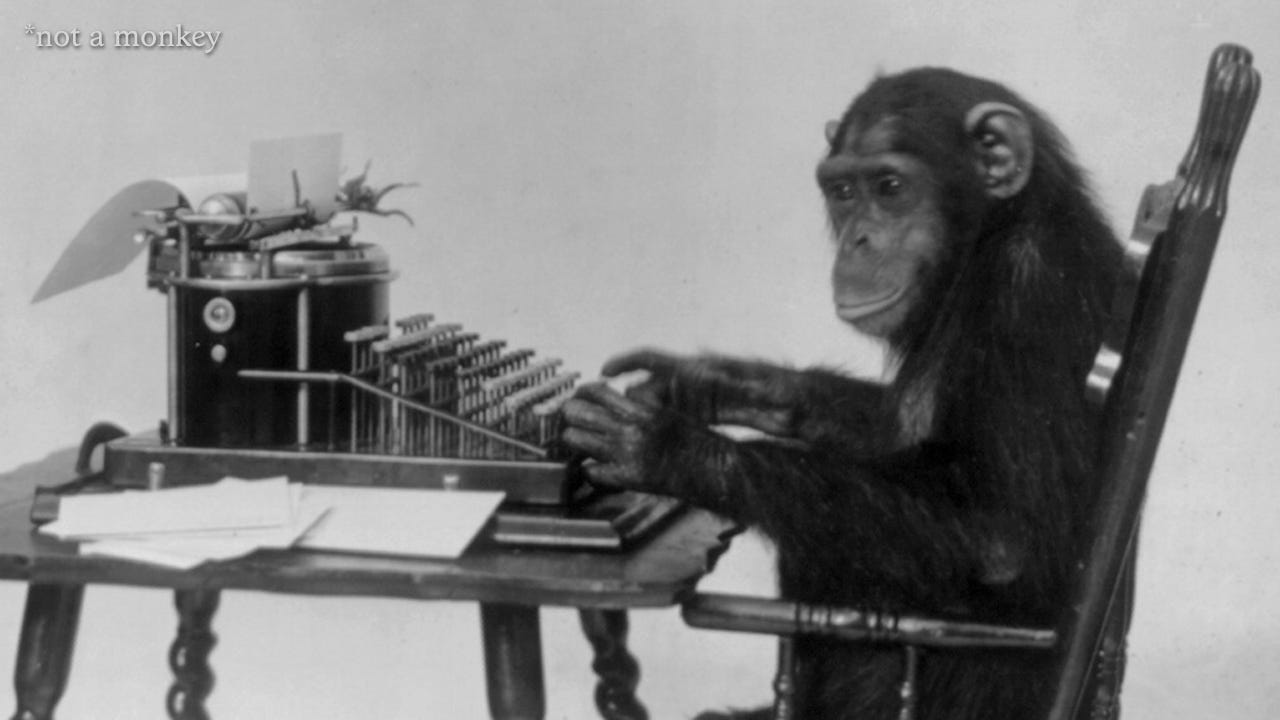You were told there would be no math in this Substack. You were lied to. (Sorry.)
Émile Borel was a French mathematician at the turn of the 20th century. This was an exciting time to be working in math and science. Einstein was about to discover the Big Bang Theory, an international convention established Le Grand K (the International Prototype Kilogram or official and exact weight of 1kg), and the Wright Brothers were about to strap a lawn chair and a motorbike engine to a box kite and fly over the Carolina dunes.
For his part, Borel arguably had much less of an impact on the world of science and math. In fact – again, arguably – his infinite monkey theory has had a much bigger impact on us writing nerds than those science geeks. It’s a concept that lurks in the dark corners of many writers’ minds. Why? Let’s start at the beginning…
The infinite monkey theory in its original form states that a (single) monkey, if given an infinite amount of time, will almost surely (another math/probability term) type out any given text including the complete works of Shakespeare. That’s been bastardized over the century to become a meme featuring a million monkeys* on a million typewriters. Which, of course, sounds even more horrific! Imposter syndrome is bad enough. Now we have to worry about a million monkeys outwriting us, too?
Of course, this is something that will almost surely never happen in the average monkey’s lifetime. For example, the chances of a monkey randomly typing out “banana” on a 50-key keyboard are 1 in 15,625,000,000. Now multiply that by all the words, in order, that Shakespeare wrote. All you need is to get stung once, like “To be or not to bee…”, and even if you got every other word in every other play right, the whole thing doesn’t count.
Why am I telling you all this? Because I’ve uncovered the secret to putting those million monkeys to work for you.
Setting Up a Foundation for Our Monkeys Metaphor
The core premise of To Write with Wild Abandon is that we do our best writing when we aren’t focused on things like imposter syndrome or so-called writers’ block or perfectionism or any of the other bugaboos that keep us from writing. I’m going to add to this now. Not only do we write better when we’re not focused on the negative, we can tap into our purely creative selves more effectively when we are not focused on anything. I mean, anything!
I’ll go back to the post I wrote about the mighty yawp from Dead Poets’ Society as an example. “Don’t think!” Robin Williams yells at Ethan Hawke. “Close your eyes! Tell me what you see!”
Without thinking too much, Hawke spits out a poem that is poignant and real. In fact, you can tell by the look on his face that he is still convinced that he has nothing of any real substance to say, even though the classroom is stunned.
Now, imagine you’re supervising your million monkeys and you read that same poem on one of your monkeys’ typewriters. You’d likely be just as stunned. But here’s the best part: that poem would be yours. Your monkeys; your glory.
The “Almost Surely” Way to Be Those Million Monkeys… and Don’t Call Me Shirley
Of course, you don’t really have a million monkeys chained to typewriters in your basement. They are all in your head. But you can be those million monkeys. In fact, this is a great way to unleash your creativity.
You’ve probably sussed out that this is a variation on another core theme of To Write with Wild Abandon: Don’t think; just write. We already know that our brain – or our muse – likes playing games with us, and sometimes we have to trick it into wanting to write. Imagining that we are letting our million monkeys just spit out some words is another way to do that.
Try this:
Sit down to your laptop or notebook or preferred writing tool
Close your eyes and clear your mind
Type the first word that comes to mind. And then the next. And then the next. Just keep typing random words without worrying about any of the words that came before or that will come next. It may be helpful if you’re typing on a computer to turn off the screen or monitor.
Like sawing into a log, it will probably take a bit of time before the teeth begin to bite, but eventually you’ll get a smooth rhythm and the words will start flowing freely.
Do this for 20 minutes or so. Feel free to go longer if you like, but don’t go much shorter. You need to give yourself time to (a) get that rhythm and (b) increase your chances that something you wrote has promise.
Go back and highlight the chunks of text or word associations that stand out. You may even find yourself continuing with a whole poem/story/whatever based on a snippet you wrote before you’ve had a chance to go back and highlight anything. That’s absolutely fine – and in fact encouraged! The whole point is to inspire you to write a new and fresh piece.
I don’t want to be overly negative with Point 5. But the reality is, most of your words won’t be very good, just as most of the text those million monkeys write will be gibberish. To mix in another metaphor, you have to go through a lot of rock to get that one ounce of gold.
That’s okay though. We already know that not every word will be gold. The whole purpose of this exercise is to come up with some fresh and new ideas that you wouldn’t have come up with otherwise. If that creates a bunch of not-so-inspiring words, it’s still totally worth it.
Plus, we have some HUGE advantages over those million monkeys:
We can write with random(ish) words, not random characters on a keyboard, which greatly improves our changes of stringing together an intelligible sentence.
Our subconscious usually takes over, just as it did for Ethan Hawke. So again, even though we are writing seemingly random words, our brains and muses add methods to our madness.
Most of us smell better than a basement full of monkeys.
Give it a try! What gold will you find in your 20-minute burst?
Key Takeaway: Be the million monkeys by writing without thinking. If you concentrate on putting together seemingly random words for a sustained period of time (20 minutes or more), you’ll produce lots of gibberish, but you’ll also likely find some gold nuggets you wouldn’t have otherwise.
Come On and Make It Easy
Did you give it an honest try? What happened? Did it make it easy? Let us know in the comments below!
In the meantime, I’ll leave you with the Beatles and Everybody’s Got Something to Hide Except Me and My Monkey.
Until next time, keep writing with wild abandon!
~Graham
*The images in all the memes I’ve seen have featured chimpanzees, not monkeys, which drives the part of me that craves accuracy up a wall.
Thanks for reading To Write with Wild Abandon! Subscribe for free to receive new posts and support my work.
email me if you get lost.










Good stuff Graham!
I read this and immediately felt better about all the gibberish poems I've still kept stored in my notes because they were a product of a similar exercise 😀